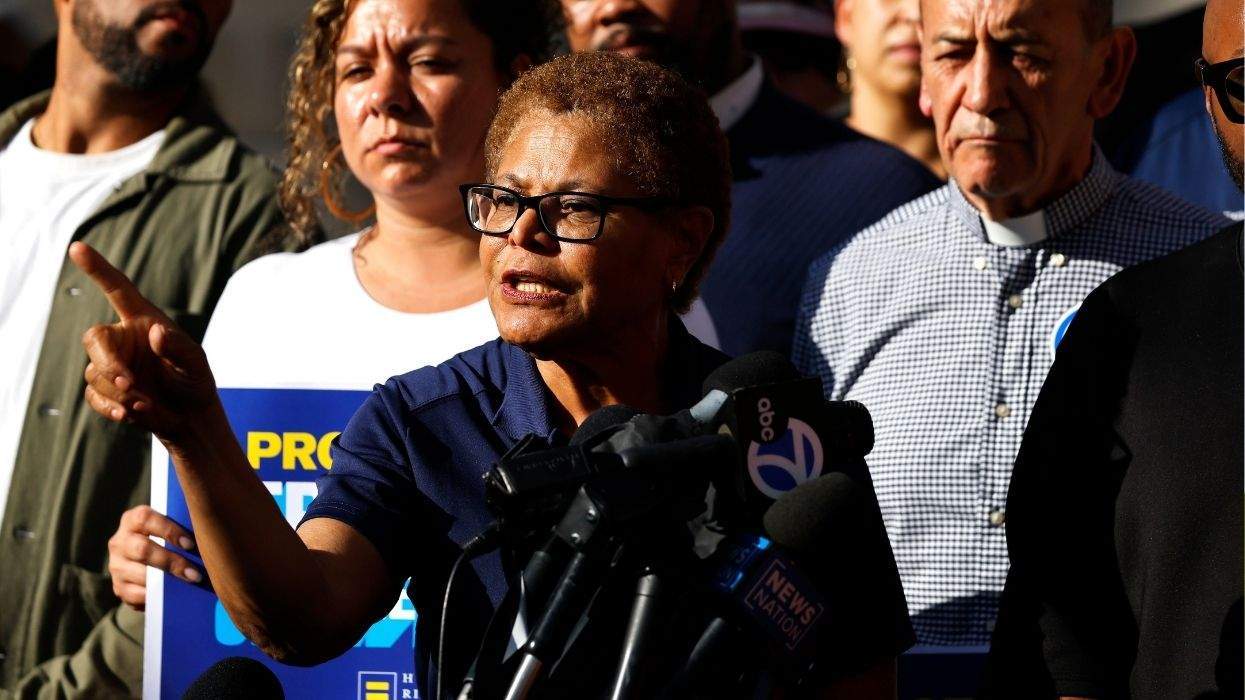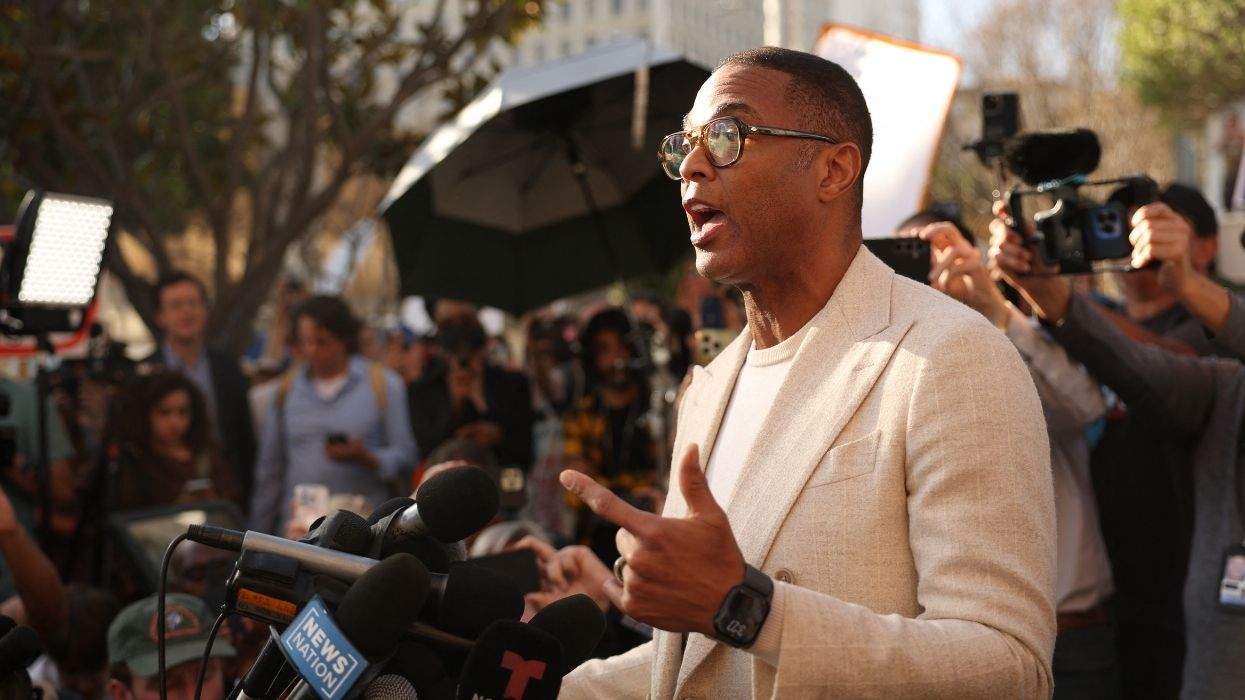From pornography bootlegger to right-wing media mogul is an unconventional journey. But much about David D. Smith, executive chairman of Sinclair Broadcast Group, is unconventional.
Sinclair and Smith have been much in the news lately due to revelations of segments Sinclair stations were forced to air, such as those condemning "fake news" and commentaries by Boris Epshteyn, a former aide to Donald Trump. But the company's -- and its chairman's -- association with the extreme side of conservative politics goes back much further. It includes ties to the effort to discredit 2004 Democratic presidential nominee John Kerry and a campaign to promote the George W. Bush administration's policies via controversial pundit Armstrong Williams.
Sinclair is not only a broadcasting powerhouse but part of a right-wing propaganda machine, says Brennan Suen, director of the LGBT program at Media Matters, which monitors misinformation spread by the right through media. These days it's "almost always running defense for the Trump administration," he says, while adding that its pattern of being less than objective goes back decade -- and comes from the people at the top, including David Smith.
Smith is a man who denies he has a political interest in Sinclair's journalistic practices, but his company's political action committee donates mostly to Republicans (Smith personally has donated to both Republicans and Democrats, but more to the former). He also contends the coverage is centrist and other media outlets are left-wing -- but Sinclair has often been in the business of making conservatives look good and liberals bad. And Trump is a big admirer.
The Maryland-based company, which traces its origins to one Baltimore TV station founded in 1971 by Julian Sinclair Smith, has grown into a media empire with 193 TV stations in 89 markets, according to its website, which notes that it "owns and operates, programs or provides sales services to more television stations than anyone" and "is the leading local news provider in the country." It also owns radio stations, a sci-fi cable network called Comet, and various digital platforms.
Its stations span the nation, from Washington, D.C., to Bakersfield, Calif. Many of the stations are in smaller markets -- for example, Abilene, Texas; Peoria, Ill.; and Traverse City, Mich. There are some larger cities on the list, though, such as St. Louis, Milwaukee, and Cincinnati in addition to Washington and Baltimore. It has no stations in the three largest U.S. cities -- New York, Los Angeles, and Chicago -- but that would change if the Federal Communications Commission approves its acquisition of Tribune Media, which would add 42 stations to Sinclair, including stations in those cities. Some of the stations are independent, some affiliated with major networks (ABC, CBS, NBC, Fox, Univision).
Sinclair Broadcast Group was founded in 1986 to combine the operation of TV stations owned by Julian Sinclair Smith and his four sons, David, Fred, Duncan, and Rob. Previously, David Smith had managed TV stations and founded a company that manufactured broadcasting transmitters, according to his official biography on the company website.
What the site doesn't mention is that Smith's experience also included a bootleg porn business. "In the 1970s, he was a partner in a business called Cine Processors, which made bootleg copies of porn films in the basement of a building owned by another of his father's companies, the Commercial Radio Institute," Eric Klinenberg wrote in Rolling Stone in 2005 (Klinenberg related the same information in a book, Fighting for Air: The Battle to Control America's Media, published in 2007.) Cine Processors operated only about a year, business partner David Williams told Klinenberg.
That history squares oddly with Smith's conservative politics and with a memo sent to employees that Klinenberg quoted in his Rolling Stone article, telling staffers the company was monitoring their online activity, including whether they're viewing porn."
Another salacious bit of Smith's history, Klinenberg reported in the article, is his arrest in 1996 for soliciting a prostitute who, according to police, performed "an unnatural and perverted sex act on him." "Charged with a misdemeanor sex offense, Smith cut an unusual deal: In lieu of doing community service, he ordered Sinclair to broadcast reports publicizing local drug programs," Klinenberg wrote.
But that's not the only thing Sinclair has ordered its stations to broadcast. In addition to the commentaries by Epshteyn, "must-carry" segments long included right-leaning editorials by Mark Hyman, a Sinclair vice president. (Hyman recently ceased on-air duties after being diagnosed with a brain tumor.)
Sinclair's must-run commentaries generally don't put LGBT people in the cross hairs, Suen says, but there have been some. In a commentary last October, Hyman parroted many of the talking points used by anti-LGBT organizations objecting to being designated "hate groups" but the Southern Poverty Law Center, a progressive nonprofit.
The commentary "took issue with SPLC's designation of some 'Christian ministries, think tanks and public interest law firms' as hate groups, giving an innocuous veneer to groups such as the rabidly anti-LGBTQ Liberty Counsel," Media Matters reported last fall. "The segment said SPLC's inclusion of those groups in a list of hate groups that includes 'the Klan and skinheads ... raises serious questions,' echoing an argument repeatedly made by hate groups and right-wing media." Some other segments have shown an anti-transgender bias, and Sinclair has editorialized against the California law mandating that public schools teach LGBT history, Suen says.
Among other commentaries, one by Epshteyn last summer on the white supremacist rally and counterprotest in Charlottesville, Va., supported Trump's assertion that there "very fine people" on "both sides," with Epshteyn saying, "The president correctly acknowledged that there is hate and violence coming from the left as well." Then there was one by Hyman in January by Hyman saying people who make accusations of sexual assault shouldn't automatically be granted anonymity. "Hyman failed to note the very real dangers people face when they come forward," Media Matters reported.
Going back some years, Suen says, immediately after the terrorist attacks of September 11, 2001, Sinclair required local news anchors to read scripts saying the company supported President George W. Bush and opposed terrorism -- the latter statement being uncontroversial but not necessarily translating to an endorsement of Bush. Also among must-runs are "terrorism alerts" that often conflate Muslims with terrorists, Suen says.
During the second Bush administration, Sinclair made other decisions that drew criticism. In 2004, it ordered its stations affiliated with ABC not to air a Nightline episode that included the names and images of all U.S. troops killed in the Iraq War, a little more than 500 at the time. Sinclair released a statement saying the program "appears to be motivated by a political agenda designed to undermine the efforts of the United States in Iraq."
The decision, however, was denounced by a Republican respected by Republicans and Democrats alike, U.S. Sen. John McCain of Arizona, who called it unpatriotic. But Smith responded to McCain in a letter saying, "Our decision was based on a desire to stop the misuse of their sacrifice to support an antiwar position with which most, if not all, of these soldiers would not have agreed." Also during the Iraq War, Sinclair sent Hyman and another correspondent to the combat zone with the express purpose of providing positive coverage of "untold stories" that the "liberal media" ignored, as the company said at the time.
Later that year, Sinclair decreed that all stations air a documentary titled Stolen Honor: Wounds That Never Heal, which denounced John Kerry's activism against the Vietnam War after he returned from serving in the conflict. Kerry was then a U.S. senator from Massachusetts and the Democratic presidential nominee, running against Bush. After much public outcry and a complaint filed by the Democratic National Committee with the Federal Election Commission, Sinclair stations just aired excerpts of the documentary instead.
To what extent do these moves have Smith's fingerprints on them? A lot, according to Suen and other observers. Smith's friendship with conservative commentator Armstrong Williams led him to give Williams airtime for several interviews during the George W. Bush administration, including with Education Secretary Rod Paige and Vice President Dick Cheney, Klinenberg's Rolling Stone story noted. But it turned out that Williams's public relations firm was being paid by the Department of Education to promote Bush's policies. Smith said at the time he wasn't aware of the connection.
Smith has long maintained a low public profile, although it has risen recently, due to the outcry over the "must-run" commentaries and the requirement that news anchors read the statement warming viewers about unreliable news sources. But he has little use for the print media, as he showed in turning down New York magazine's request for an interview late last year. "The print media is so left wing as to be meaningless dribble which accounts for why the industry is and will fade away," he said in an email, published by New York this month.
He had an email exchange in April with The New York Times over the "must-run" segments after sports news site Deadspin compiled a video of them that went viral. "Not that you would print it, but do you understand that every local TV station is required to 'must run' from its network their content, and they don't own me," he wrote. "That would be all their news programming and other shows such as late-night talk, which is just late-night political so-called comedy."
That's a false equivalency, says Suen. "Nightly news is very, very obviously branded, and so is late-night comedy," he says. But viewers of local newscasts aren't told that certain segments come from Sinclair (even though the commentaries are labeled as commentaries) or that Boris Epshteyn is a former Trump adviser. "It's still failing its viewers," he says of Sinclair, adding that local broadcast stations are often the only source of news and opinion for poorer audiences, due to the cost of cable television.
As to whether Sinclair's pro-Republican spin is driven by Smith's business interests or his ideology, Suen says the answer is likely both. "He saw Donald Trump's election as an opportunity to deregulate broadcasting," says Suen, which is important given Sinclair's acquisitive ways and the pending Tribune Media merger that would give it access to 72 percent of the nation's households. But there are also Smith's rants against other media's liberal bias and his company's funneling of money to Republican candidates.
In 2017 and so far in 2018, 80 percent of funding from the company's political action committee has gone to Republicans, according to a recent report from the Center for Public Integrity. In 2017, Smith personally gave more to the Democratic Senatorial Campaign Committee than to its Republican counterpart, but overall, since 1995, he has contributed $206,650 to Republicans and $132,350 to Democrats in congressional and presidential campaigns. Major donors often give to both parties in the name of access.
As for access, in an interview with The Guardian this week, he recalled meeting with Trump during the presidential campaign. "I asked [Trump], 'Would you like us to embed with you during your campaign?'" Smith said. "And he brought a bunch of people in the room, and he said, 'Well, whatever.' And I said: 'We are here to deliver your message. Period.'" He said that didn't amount to a promise to favor Trump, but merely guaranteed Sinclair access to him. He also said he made a similar offer to Hillary Clinton, but she declined. However, much of Sinclair's programming has been heavily favorable to Trump, during the campaign and after. He also told the paper about recently talking to White House officials about a new technology that will allow government agencies to boradcast directly to Americans' phones.
Smith, though, denied any political leanings in the Guardian interview and said he's all about making money. And he dismissed the controversy over Sinclair's journalistic practices. "I don't know what I would change," he said, "because everything that we've done is absolutely unassailable under any circumstances."
The jury, or at least the court of public opinion, is still out on that.















Charlie Kirk DID say stoning gay people was the 'perfect law' — and these other heinous quotes
These are some of his worst comments about LGBTQ+ people made by Charlie Kirk.